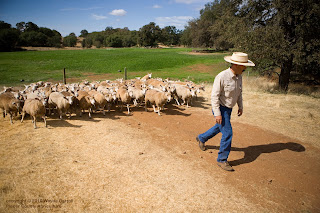I suppose all farms (and all businesses, for that matter) evolve over time - economic and market conditions change, and so must our farms. In my mind, a sustainable farm must be address it's ecological, social and economic viability - a business is not sustainable if it's not generating a profit. If you've been reading Foothill Agrarian over the last year, you'll know that Flying Mule Farm has been in the midst of some significant changes to our business, and some important questions about our economic sustainability.
Since the first part of 2013, I've been trying to balance our sheep operation - which consists of approximately 200 ewes - with a part-time job. I took the job after realizing that 200 ewes would not generate enough income to meet my family's financial needs (which include minor details like a mortgage, health insurance, college savings and groceries - minor details!). I made a conscious decision to try to balance working 20 hours a week while caring for our flock.
Through the winter and spring months, this seemed to work - I made it through lambing season (with its intense labor demands) without too much stress. As we've progressed into summer (and irrigation season), however, the stresses have mounted. I've realized that I just don't have enough time or energy to spend 2-3 hours moving irrigation pipe on top of my regular 12 hour days. As a consequence, we don't have as much irrigated pasture as we need to keep all of this year's lambs until they are ready for processing in October or November.
In response to these conditions, we've decided to keep just those lambs that we have green grass to feed - we'll be keeping about 75 lambs this year, 30-40 of which we'll market as grass-fed lamb (the balance are ewe lambs that will replace older ewes in our flock). These 75 lambs will graze on pastures that would be irrigated whether we have sheep on them or not.
We're marketing the rest of our lamb crop as we speak. While our business has largely relied on local markets for our meat, this year we're selling most of our lambs live. For the next three weekends, I'll be hauling lambs to our buyer. While we'll have to accept a lower price this year, we also won't incur the significant expense involved in processing lambs and storing meat. Interestingly, we might actually be better off from an economic standpoint - we'll see.
When I started raising sheep, I was motivated in part by a desire to provide my community with locally grown, grass-fed meat. While this still motivates me today, I've realized that I'm more motivated by my love for working outside on the land - and with sheep, day-in and day-out. In other words, I love the actual work of raising sheep. To continue doing the work I enjoy doing, my business has to evolve to a more profitable (and therefore, sustainable) model. I'm not sure we've found any answers this year, but we'll keep trying!
Thoughts about sustainable agriculture and forestry from the Sierra Nevada foothills.
Subscribe to:
Post Comments (Atom)
-
Mo keeping track of our newest bummer lamb If you raise sheep, at some point, you'll have a lamb whose mother won't - or can...
-
Here's the next installment from my Sheep Management Basics talk: Overview – Why Not Lamb in a Barn? Conventional wisdom indicate...
-
On Sunday, I’ll make the two-hour drive to Auburn to participate in the Gold Country Fair’s Livestock Awards Ceremony. The Junior Livestoc...




No comments:
Post a Comment